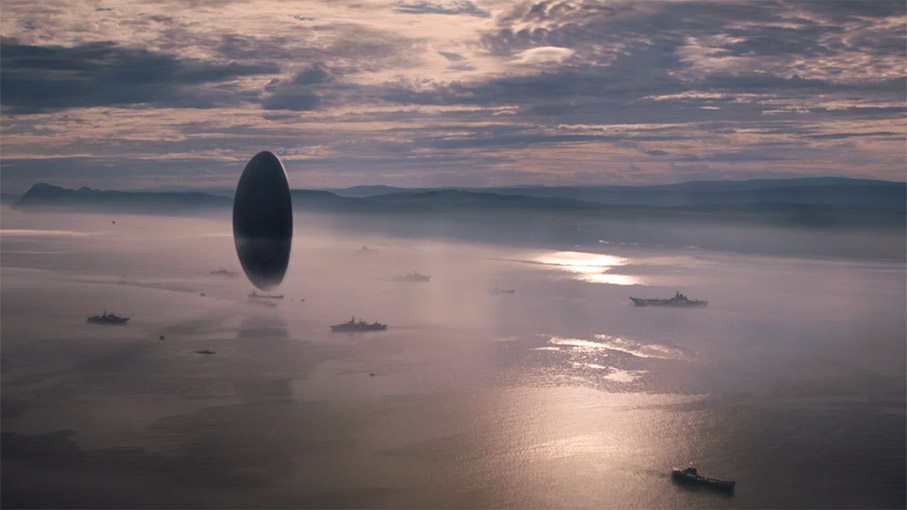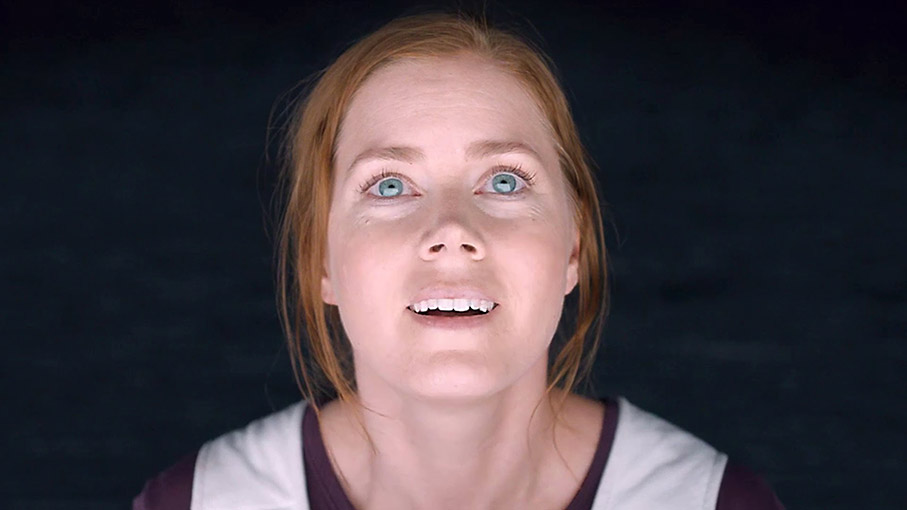| |
"I had been wanting to do sci-fi for a very long time. 2001: A Space Odyssey is a movie that really impressed me as a teenager. And also Blade Runner. And Close Encounters of the Third Kind is also one of my favourites. I'm always looking for sci-fi material, and it's difficult to find original and strong material that's not just about weaponry." |
| |
Director, Denis Villeneuve |
Personally speaking, there are very few films out there that seem to be DNA engineered to pander directly to my tastes but hey, that's a favourite threesome of movies right there in that quote. The idea of a science fiction thriller about linguistics makes it almost impossible for me to concede that I wouldn't enjoy every second. I'm six hours away from the Thursday evening preview and I feel like I've been pre-programmed to enjoy Arrival. The extraterrestrial slap on the glass in the trailers is very reminiscent of the 456 aliens in Torchwood's Children of Earth serial but I doubt the sacrifice of young ones is on Arrival's agenda. I may be wrong. Having read a rather soft review in this month's SFX magazine, there was a momentary hesitation, a deflation of expectation but hey, no one listens to critics, right? More astonishing is that I've gone this far in my opening paragraph twenty-four hours after the darkest political day the planet has ever witnessed (OK, I'm no historian but…) and not mentioned how profoundly anxious I am about history repeating itself with racism and bigotry coming back from what I thought was exile and it turns out to have been an extended holiday. Trump's success tells us more about the myriad basic fears of the human animal and none of them is good for America or the world. He may confound his critics. Even atheists are probably praying he will.

So, to another global event, hoping it's so much more worthy than yesterday's stunning bomb blast. Just got back from the screening. Oh yes. In fact, Arrival's message could not be more timely but I'm not about to reveal why that's so but you can probably guess. On the subject of translation, a few years ago I discovered something about a work I knew very well, a short novel written by the man whose name I have borrowed as a pseudonym for this site. Albert Camus' L'Étranger (or The Outsider) starts with these words, a sentence that takes you into the man's character as swiftly as any witnessing of his actions. In its original French it reads "Aujourd'hui, maman est morte." School grade Français, move along, nothing to see here. "Mother died today." But in 2012, Ryan Bloom in the New Yorker magazine put forward a theory that suddenly turns this simple sentence emotionally one hundred and eighty degrees about. The use of the word 'Mother' makes the narrator seem cold and distant. As he will be judged more by his character than his deeds (the theme of the novel), it's an important handshake to offer the reader. The very word 'Mother' tells us reams about the man but what if the word was 'Mummy'? We would assume a child was narrating. Bloom suggests that 'Mum' may be too abrupt and champions the translation of no translation as the word 'Maman' would be easily recognisable in most languages and sets the idea of entering an unknown world to the English speaking reader. It's also a soft and welcoming word, the extra syllable making all the difference. Say it out loud. It's impossible to make it sound cold. If you know the novel and want to read why Bloom thinks even the syntax has been translated badly, then the article is here;
http://www.newyorker.com/books/page-turner/lost-in-translation-what-the-first-line-of-the-stranger-should-be
That's one word in French in one sentence and look how we can meander down many paths of translated meaning. OK, how about the idea of conversing with an alien species? Ripe for a little misunderstanding, you think? Gene Roddenberry got away with the fabled 'Universal Translator' in Star Trek. It's time we took on board how difficult it would really be to communicate with a sentient, alien life form.

Arrival is based on the short story by Ted Chiang entitled 'Story of Your Life', which is too much like a cuddly rom-com title hence the change. The set up is Independence Day light. Twelve dark alien craft have settled at various positions across the globe. The ships are impervious to many terrestrial physical forces including gravity and light. The saucer design, black as pitch with some mottled variation in contrast on its hull, is tipped on its edge, floating above the ground telling physics just when it can put its coat on and leave the building. Every eighteen hours, the extraterrestrials reveal themselves from behind a transparent wall floating in white smoke, presumably to allow human interaction with pictures and sound. The US brass is scared with wits intact and its first response is to get the answers to two questions, (1) Why are they here? and (2) Where did they come from? The fear that they are invaders is never entertained by the filmmakers, only by the rest of the trigger happy idiots that constitute those in charge and let's not forget rampantly dumb, ill-informed public opinion. There were moments that reminded me of the utter nonsensical display of violence towards things not understood (the shooting of Klaatu in both versions of The Day The Earth Stood Still come to mind) but never fear (!) there are very smart people on the case.
Louise Banks (Amy Adams) is a gifted linguist approached by a US forces General (Forest Whitaker) to help in human/alien interaction. The opening scenes show her relating to her daughter Hannah and within minutes of screen time covering presumably eighteen years or so, her saying goodbye to her child taken from her by what a good friend of mine once called 'Jack the Dancer'. She says she cannot play the communication game without standing in front of those doing the guttural and clicking 'language' played back on the General's recorder. She presumes her refusal to help will force the General to seek another's aid. She sets the General a question to ask the other linguist, "What's the Sanskrit for 'War'?" setting off a beautiful examination of how language can be endlessly interpreted in so many diverse ways. Most of the humour in this warm, mostly pro-global cooperation movie comes from Banks' examples of linguistic traps to be avoided. The answer to the "What is war?" by the way is rather lovely and says a lot about the Indian culture that's trying to find a way to define what we know as terrible conflict. It is "…the desire for more cows." Lovely. Assigned to work with her once the General returns with a military helicopter to scoop her away to the alien craft is Ian Donnelly (Jeremy Renner). A physics professor employed to cover the more 'standard' mathematical and theoretical ground, he gels with his colleague's way of working and the two form a close bond.

The bulk of the movie is taken up by the process of finding a communication bridge, a basis to form a relationship with the christened 'heptapods', seven limbed free floating squid-like creatures. All the humans have to go on are circles of inky communication with different thicknesses and extra spikes on the wheels of this 'one-to-one' interaction. But Louise is smart and decodes the circles and is able to actually communicate through rudimentary repetition of the circles and parts of the circles shown back to the alien creatures. Swathed in white mist, the design of the extraterrestrials is never set up as something to see the movie for but I am guilty as the next human at desiring to see what Villeneuve comes up with alien design wise. It's good enough to render the aliens 'alien' and broad enough for us to accept the creatures as alien without any other dramatic baggage getting in the way. World reactions after a good month of toing and froing escalate to what can be summarised as "We can't understand them so let's explode things in their ships to make them understand that humans are not to be screwed with." In a part of the film that felt a bit odd, we are asked to accept that a bomb was set up to explode without our heroes' knowledge (and those who planted the device just let the pair go in to the ship?) The upshot of this bit of human stupidity is that the aliens create a way for our heroes to survive but because of the idiotic global fuss about the exact meaning of the word 'weapon' (no spoiler, it's in the trailer), the forces of the world get horribly belligerent and this leaves a tiny window for Louise and Ian to find out the answer to the aliens' final communication before WMD become the final human response. If the movie got 'humans' right, then first contact could be as depressing as it could threaten to be, particularly after January 2017...
It's now we enter into Einsteinian territory. Interstellar paid a small narrative price by visualising the time-space tesseract in which and via which our hero could communicate across time to his pissed off daughter via her bookshelf in her bedroom years earlier. What is deliciously cinematically subversive about Arrival is that flashbacks and memory take on so much more significance when we realise that flashbacks and memory are perhaps nothing of the sort. Villeneuve uses severely narrow depth of field shooting to create a dream state that may or may not be previous experiences. He also chooses to shoot some significant character moments from behind the actors' bodies and faces relying on the audience to extract meaning and derive a connection without seeing the look in their eyes, usually a no-no in cinema. Given this, Amy Adams is the emotional rock at the centre of the drama. She's quite a subtle actress as well as utterly convincing and it's also nice to see Renner's softer side, something Joss Whedon exploited in Avengers: Age of Ultron.
I'll say no more wishing not to rob you of joining the dots as the characters do literally that to stay ahead from the ever-growing threat of confrontation. Let's just say that 'space-time' is as much a character in the latter part of the film and you have to be open to understanding that film time also is being subverted. We've had 'space-time' feature in many other movies. Perhaps the most ridiculous was Disney's The Black Hole and the most sublime, the previously mentioned 2001: A Space Odyssey. What Villeneuve is doing is expertly perverting the language of cinema to suit his own narrative ends and ladies and gentlemen, it works wonderfully well. The conclusion is also very moving bolstered by a revelation that reveals the jigsaw in such a subtle way. This is a film about hope and reason and more we can get of both, the better. Check it out.
|